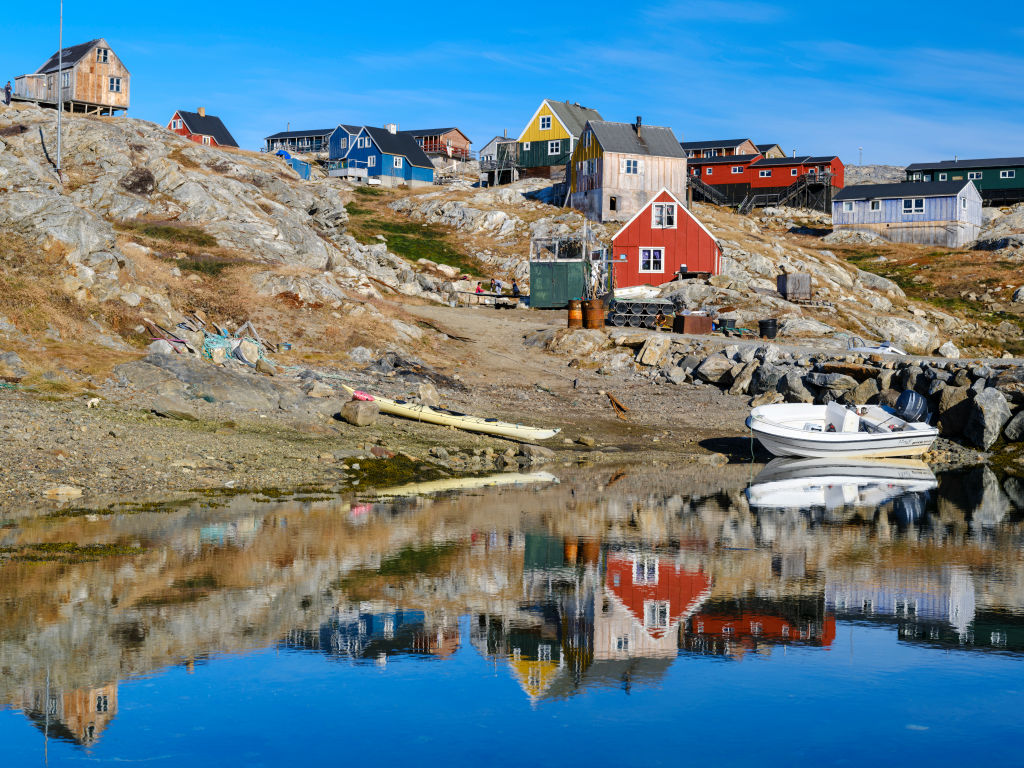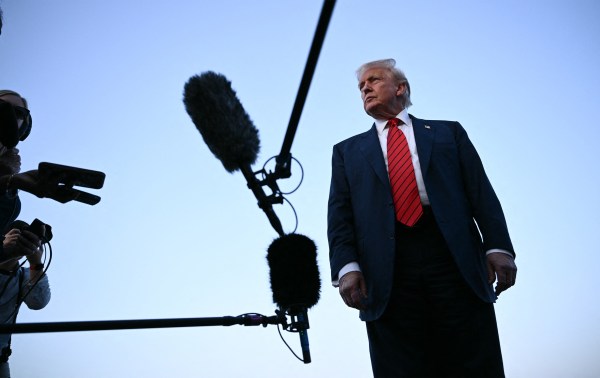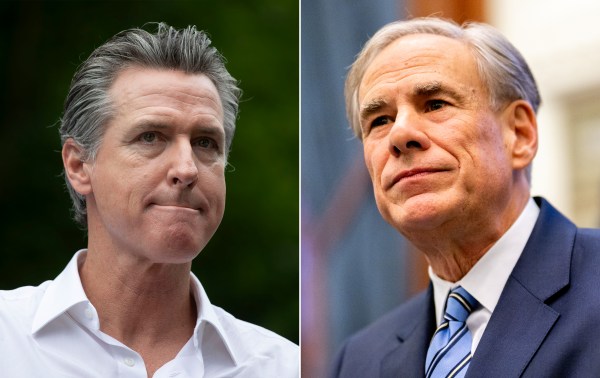When Donald Trump first threw out the idea of buying Greenland during his first term in 2019, Danish Prime Minister Mette Frederiksen called it an “absurd discussion” and it seemed as though few disagreed with her. Now Trump is about to resume power and appears to be serious about acquiring the North Atlantic territory.
The idea is not absurd—interest in a U.S. acquisition of Greenland dates to the 1860s, and President Harry Truman made a secret bid to acquire it in 1946. In addition to being rich in natural resources, the location of the autonomous Danish territory gives it strategic importance as a buffer against Russia and China as the Arctic ice melts and opens up new shipping routes. Plus the U.S. already maintains a military base there—now dedicated to the Space Force.
But there’s another option, one that would better serve the interests of both the U.S. and Greenland: Greenlandic independence.
An independent Greenland is not a new idea. In 1953, in the aftermath of Icelandic independence from Denmark, Greenland was legally declared no longer a colony of Denmark. Greenlanders were granted Danish citizenship and gained representation in the Folketing, the Danish parliament. Since 1979, Greenland has had home rule, with its own regional parliament responsible for managing most of its internal affairs.
But not its external affairs, and that has created tension between Denmark and its territory. Denmark joined the European Union (at that time known as the European Communities) in 1973, chiefly to safeguard agricultural exports to the United Kingdom, which had also joined the EU that year. This decision caused an uproar in Greenland, as it gave fishermen from all over the EU the right to fish in Greenlandic waters, endangering Greenland’s own fishing industry. For as long as Greenland has been populated, fishing has been a cornerstone of its economy, culture, and society. Greenlandic voters opted to leave the union in a referendum held in 1982.
Danish and Greenlandic interests have only continued to diverge. Today 26 of the 31 seats in the Inatsisartut (Greenland’s parliament) are held by parties that support independence from Denmark. Authorities in Copenhagen have long been resigned to the eventuality of Greenland’s independence, insisting only that Greenland must hold a referendum before they agree.
In light of Trump’s demands for annexation, Greenland Prime Minister Múte Egede has called for such a referendum this year. There are many reasons Trump and the United States should stop talking about annexation and instead support such a referendum.
An independent Greenland would open access to natural resources, including rare earth minerals, worth trillions of dollars. One of the main arguments against Greenlandic independence is the country’s economic dependency on Denmark. Half of Greenland’s annual government funding consists of a $500 million grant from the government in Copenhagen, which an independent Greenland would have to replace.
That’s barely pocket change for the United States, which could easily agree to cover the shortfall for a certain number of years as part of an overarching trade deal that would permanently block China from accessing Greenland’s resources.
While there is some limited mining already happening, Greenland has been reluctant to allow more over concerns that the revenues would redound mostly to Denmark, or that the Danes could dictate the terms of deals in ways unfavorable to Greenland. Mining also has an environmental impact, and many Greenlanders are skeptical that Denmark would safeguard the island’s interests and ensure proper clean-up and maintenance of mining sites. As an independent state, Greenland could set its own standards and policies.
Greenland also has between 17.5 billion and 52 billion barrels of oil, worth between $1 trillion and $4 trillion at current prices. In 2021, Greenland banned oil exploration, citing among its reasons that the world is shifting away from oil and that it did not want to become dependent on a non-renewable resource. These are fair concerns. Yet, an independent Greenland free to reinvest oil revenue where it saw fit would almost certainly rethink this decision. Greenland’s economy is criminally underdeveloped, with fishing still its main export, and its infrastructure so poor that many cities are still accessible only by boat or plane. Allowing exploration while investing proceeds in infrastructure would create an overabundance of high-skilled jobs.
In addition to oil, Greenland is home to an estimated 148 trillion cubic feet of natural gas. With revenues from its natural resources unlocked, not only would Greenland no longer have a fiscal deficit—it may not even have to levy an income tax.
Greenland’s independence from Denmark—without becoming a U.S. territory—would be the right move for other reasons. As long as Greenland depends on the EU for trade, it is in practice subject to most of its regulations, including the increasingly strict environmental regulations—like a ban on seal products that caused a 90 percent collapse in sealing exports and greatly harmed the Inuit community. As an independent country, Greenland could properly integrate into the North American economy.
Some may question whether Greenland, with a population of only 56,000, could be too small to be a viable independent state. However, several European states are that same size or smaller: Liechtenstein, Monaco, Andorra, and San Marino all have populations below 100,000. All are prosperous and have functioned for hundreds of years. Greenland has already had home rule for more than 40 years, proving it is capable of (mostly) governing itself despite its limited population and geographic isolation.
The one area Greenland absolutely cannot handle on its own is defense. Greenland is huge, strategically important, and has a vast coastline that its tiny population could never feasibly guard on its own. Given the important role the Arctic plays for national security, and the fact that the U.S. already has a base on Greenland, it would make sense for the U.S. to bundle some type of defense agreement and trade agreement with Greenland that may or may not involve the country becoming a member of NATO.
By promoting independence rather than annexation, the United States would avoid the headache ensuring fair representation for Greenlanders. Granting statehood, and with it two senators and three electoral votes, to a territory with only 56,000 people would create political backlash in the United States (especially once Republicans realized those two senators would likely be Democrats). But it is extremely unlikely that Greenland would agree to join the United States as a territory rather than a state.
Independence would also be a face-saving move for Denmark. No government wants the humiliation of handing over territory to another country, especially against the wishes of the population in that territory. But granting a binding referendum on independence and abiding by the outcome would be in line with what the Danish government has always said, namely that it would allow Greenland to become independent if this was the expressed will of the people.
Of course, the United States could in theory take Greenland by force. This, however, would mean the end of NATO and the rules-based international world order as we know it.
But by promoting independence, Donald Trump and the U.S. would receive a great deal of goodwill as Greenlandic nationalists would credit them with nudging Denmark to finally put the issue to a ballot. This could prove invaluable in future negotiations about trade and natural resource exploration. After all, Greenland is actively working to diversify its economy and expand its service sector anyway. Trump once jokingly promised that he would not build a Trump Tower in Greenland’s capital of Nuuk—but in the end, Greenlanders might not object.









Please note that we at The Dispatch hold ourselves, our work, and our commenters to a higher standard than other places on the internet. We welcome comments that foster genuine debate or discussion—including comments critical of us or our work—but responses that include ad hominem attacks on fellow Dispatch members or are intended to stoke fear and anger may be moderated.
With your membership, you only have the ability to comment on The Morning Dispatch articles. Consider upgrading to join the conversation everywhere.